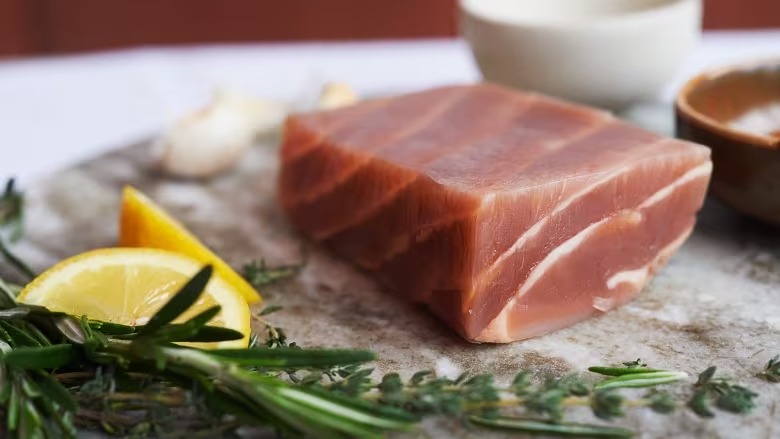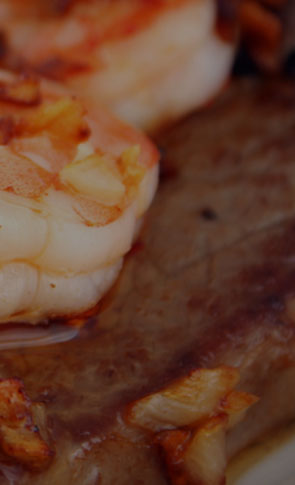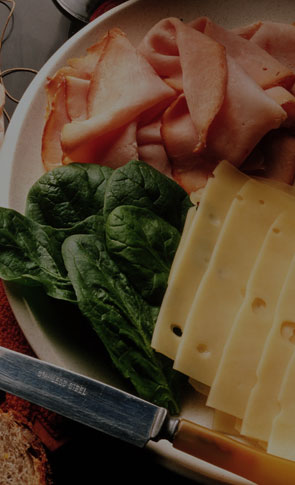It’s coming to a dinner plate near you: seafood that wasn’t fished from the ocean but was designed in a lab. And Toronto startup New School Foods is betting its faux salmon will make a splash in the market for plant-based alternatives.
“What we’re really recreating here is the sensory experience, the texture of salmon,” said Chris Bryson, the company’s founder and CEO.
He said the whole-cut filet is one of the first products of its kind. It was developed with new technology to create muscle fibres made entirely of plants and promises to look and taste like the real thing.
New School’s salmon substitute, made of seaweed, algae and plant proteins, aims to replicate the nutritional profile of real salmon by adding Omega-3 and Omega-6 fatty acids, iron and vitamin B12.
Bryson said that’s top of mind for consumers concerned about the health impacts of real salmon, which may contain mercury or microplastics. He also touts plant-based alternatives as a better choice for the environment.
“Learning about how unsustainable our food system is … livestock farming is responsible for a massive amount of deforestation and greenhouse gases, the oceans are super overfished, so it’s very clear that we need better ways to eat.”
Cooking up some competition
Plant-based seafood has been slower to hit the market than other meat alternatives because it’s more complex to develop, but some Canadian companies are diving in.
Victoria-based Save da Sea reimagines vegetables, making smoked salmon out of carrots. TMRW Foods, headquartered in Port Coquitlam, B.C., cooks up crab cakes from jackfruit, while Konscious Foods in Vancouver offers plant-based sushi. All three companies have hit store shelves in the past year, picked up by major retailers such as Walmart, Loblaws and Whole Foods.

These startups come at a tricky time for the sector. Plant-based meat alternatives launched amid much hype, with U.S. grocery store sales growing 45 per cent in 2020, according to the Good Food Institute, a U.S. non-profit that promotes alternatives to animal products. Since then, consumer enthusiasm has waned, leading to a drop in supermarket sales. Industry analysts say some consumers didn’t want to pay the premium prices of many of the products, while others may not have been convinced by the taste.
“It’s been a function of not enough momentum to get the next wave of consumers to try the category,” said John Baumgartner, New York-based managing director for Mizuho Securities.
Baumgartner tracks the sector and said while it’s a work in progress, there is more momentum in the plant-based seafood space. The industry is still seeing billions of dollars of investment into plant-based alternatives, and new product innovation could be the remedy to slipping sales.
“We definitely think there’s a market for it,” he said. “The question is how quickly can culture change…. A lot of this adoption of plant-based meat, it’s going to require becoming ingrained into diets.”
Show me the menu
Restaurants have caught on, with nearly half of all restaurants in the United States offering plant-based alternatives, according to the Plant Based Foods Association, headquartered in San Francisco.
In Canada, some launches have proven more successful than others. A&W and Burger King both offer plant-based burgers; Tim Hortons added Beyond Meat products to its menu in 2019, but it quickly pulled them in 2020.
“There is demand, and we see the demand through research and through our own guests asking,” said Brandon Thordarson, corporate executive chef at restaurant chain Moxies, which is based in Vancouver.

The chain put plant-based burgers on the menu a few years ago. While initially about 15 per cent of customers were looking for meat substitutes, it’s now about 25 per cent, Thordarson said, adding that he has no plans to introduce faux fish just yet, but it’s always a possibility.
“Whether it’s a Beyond Meat burger or … fake chicken or tempeh or tofu or whatever it might be, it’s not going away.”
New School Foods plans to partner with Canadian chefs and launch its product at restaurants before venturing into grocery stores. Bryson said he hopes the faux salmon will catch on and help prove plant-based food isn’t a fad.
“We really as an industry need to move to the point where we’re matching on taste and price and texture,” he said. “Then at that point, I think you’re going to see a much wider level of adoption.”

Source: Originally posted at CBC.ca




